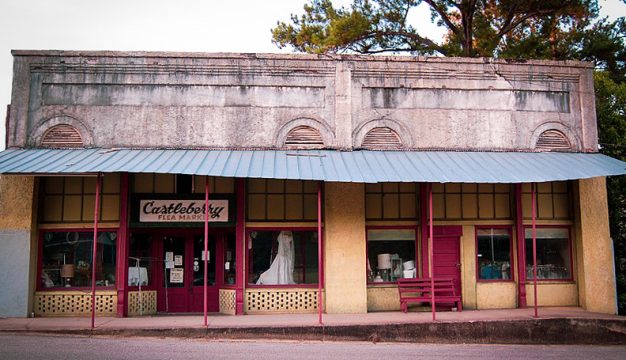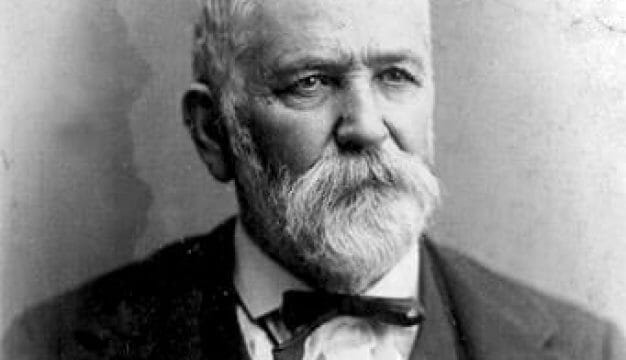William Cobb
Author William Sledge "Bill" Cobb (1937-2020) authored numerous novels and short-story collections, as well as several plays, over his more than 50-year career. His best-known work is perhaps A Walk Through Fire, which centers on the racial tensions surrounding a mayoral race in fictional 1961 Hammond, Alabama. In addition to racial strife, many of Cobb's works are noted for their considerably strange and dark comedic value consistent with the Southern Gothic genre of literature. Cobb's writings center particularly on characters who triumph and maintain their dignity in the face of failure. He received the Alabama Writers' Forum's Harper Lee Award in 2007.
 William Cobb
Cobb was born in Eutaw, Greene County, on October 20, 1937, to Sledge and Inez (Land) Cobb; he had one sibling, a sister. He grew up in Demopolis, Marengo County, where his father sold cars and farm implements, and developed a love for baseball and fishing. As a child, Cobb battled rheumatic fever and was bedridden for weeks. While idle, he read constantly and became enamored with the idea of creating characters and plots. He honed his skills and decided to become a writer very early on. In 1956, he graduated from Demopolis High School and moved to Nashville, Tennessee, working as a short-order cook. A year later, he returned to Alabama and entered Livingston State College, now the University of West Alabama (UWA), in Livingston, Sumter County. Cobb earned a bachelor of arts in English and was accepted into the creative writing program at Vanderbilt University in Nashville. While there, Cobb studied under some of the members of poetry and literature collective known alternately as the Fugitives and the Southern Agrarians, earning a master of arts in creative writing. His major advisor and mentor was famed Agrarian poet and essayist Donald Davidson.
William Cobb
Cobb was born in Eutaw, Greene County, on October 20, 1937, to Sledge and Inez (Land) Cobb; he had one sibling, a sister. He grew up in Demopolis, Marengo County, where his father sold cars and farm implements, and developed a love for baseball and fishing. As a child, Cobb battled rheumatic fever and was bedridden for weeks. While idle, he read constantly and became enamored with the idea of creating characters and plots. He honed his skills and decided to become a writer very early on. In 1956, he graduated from Demopolis High School and moved to Nashville, Tennessee, working as a short-order cook. A year later, he returned to Alabama and entered Livingston State College, now the University of West Alabama (UWA), in Livingston, Sumter County. Cobb earned a bachelor of arts in English and was accepted into the creative writing program at Vanderbilt University in Nashville. While there, Cobb studied under some of the members of poetry and literature collective known alternately as the Fugitives and the Southern Agrarians, earning a master of arts in creative writing. His major advisor and mentor was famed Agrarian poet and essayist Donald Davidson.
In the fall of 1963, Cobb joined the faculty of Alabama College, now the University of Montevallo, in Montevallo, Shelby County, as an English instructor, and was promoted quickly to assistant professor. In 1964, his short story "The Stone Soldier" was awarded Story magazine's College Story of the Year. In 1965, he married the former Loretta Douglas, with whom he would have one child. For the next 20 years, he wrote short stories and tried his hand at novels. Throughout this period, however, Cobb battled alcoholism and was largely unsuccessful in his publishing attempts until he entered a rehabilitation program and became sober in the early 1980s. Shortly thereafter, he began a very active career as a published author.
 William Cobb at Montevallo
In 1984, Portals Press of New Orleans published Cobb's first novel, Coming of Age at the Y. Set in the 1940s, the book explores the life of protagonist Delores Lovelady and introduces the fictional town of Hammond to readers. It also features Cobb's affinity for dark, macabre characters and settings consistent with the Southern Gothic genre. For example, Delores meets a varied cast of characters ranging from a minister trying to save her soul on a bus to a singer whose idea of a first date is to take Delores to an adult book store. Likewise, The Last Queen of the Gypsies (2010) follows 11-year-old Minnie, who is abandoned on the side of a road by her gypsy family in 1930s Florida because her eyes are two different colors, into adulthood. A Walk Through Fire, published in 1992, is Cobb's most critically acclaimed novel and explores the racial tensions prevalent in the American South through the fictional residents of Hammond in the early 1960s. The story centers on friends O. B. Brewster, a white professional baseball player who returns home after his career has been ended by an injury, and Eldon Long, a successful black minister. Brewster returns home to find the mayor railing against the "outside agitators" whom Long recruited to help stage civil rights demonstrations. Long believes Brewster to be a fair and honest man and the only person capable of beating the mayor in an election, so he convinces Brewster to run against the mayor. He complicates matters, however, when he becomes romantically involved with Cora Long, Eldon's wife.
William Cobb at Montevallo
In 1984, Portals Press of New Orleans published Cobb's first novel, Coming of Age at the Y. Set in the 1940s, the book explores the life of protagonist Delores Lovelady and introduces the fictional town of Hammond to readers. It also features Cobb's affinity for dark, macabre characters and settings consistent with the Southern Gothic genre. For example, Delores meets a varied cast of characters ranging from a minister trying to save her soul on a bus to a singer whose idea of a first date is to take Delores to an adult book store. Likewise, The Last Queen of the Gypsies (2010) follows 11-year-old Minnie, who is abandoned on the side of a road by her gypsy family in 1930s Florida because her eyes are two different colors, into adulthood. A Walk Through Fire, published in 1992, is Cobb's most critically acclaimed novel and explores the racial tensions prevalent in the American South through the fictional residents of Hammond in the early 1960s. The story centers on friends O. B. Brewster, a white professional baseball player who returns home after his career has been ended by an injury, and Eldon Long, a successful black minister. Brewster returns home to find the mayor railing against the "outside agitators" whom Long recruited to help stage civil rights demonstrations. Long believes Brewster to be a fair and honest man and the only person capable of beating the mayor in an election, so he convinces Brewster to run against the mayor. He complicates matters, however, when he becomes romantically involved with Cora Long, Eldon's wife.
In 1995, Cobb published Harry Reunited, which was the product of an accidental snub: Cobb was inadvertently left off the invitation list for his 25th high school reunion. The book features former classmates Harry Lizenby, a prep school English teacher heading to his 25th high school reunion, and Bud Squires, a convicted felon who is not invited to the reunion. Cobb uses the event to enable his two characters to reflect on their lives and look to their respective futures. Whereas Harry looks forward to the event, Squires uses the opportunity to exact revenge on his former classmates.
 William Cobb Novel
Cobb's other books include The Hermit King (1985), A Spring of Souls (1999), Wings of Morning (2001), and A Time to Reap (2014). In addition to his novels and short stories, Cobb was a noted playwright. Many of his theatrical works have been produced both locally and across the Southeast, including in New Orleans. In the late 1980s, three plays—Sunday's Child, A Place of Spring, and Early Rains—were produced in New York City. Cobb earned a number of awards for his short stories, including two Hackney Literary Awards from Birmingham-Southern College and recognition for best fiction, in 1984, from the Sucarnochee Review, a literary publication out of UWA. In 1987, Cobb was named Writer-in-Residence at the University of Montevallo. His collection of stories, Somewhere in All This Green: New and Selected Stories, won the 2000 Alabama Library Association's Author Award for Fiction.
William Cobb Novel
Cobb's other books include The Hermit King (1985), A Spring of Souls (1999), Wings of Morning (2001), and A Time to Reap (2014). In addition to his novels and short stories, Cobb was a noted playwright. Many of his theatrical works have been produced both locally and across the Southeast, including in New Orleans. In the late 1980s, three plays—Sunday's Child, A Place of Spring, and Early Rains—were produced in New York City. Cobb earned a number of awards for his short stories, including two Hackney Literary Awards from Birmingham-Southern College and recognition for best fiction, in 1984, from the Sucarnochee Review, a literary publication out of UWA. In 1987, Cobb was named Writer-in-Residence at the University of Montevallo. His collection of stories, Somewhere in All This Green: New and Selected Stories, won the 2000 Alabama Library Association's Author Award for Fiction.
Cobb retired from Montevallo in 2000. A few years later, he began experiencing bouts of dizziness, loss of balance, and trouble concentrating. Eventually, he was diagnosed with hydrocephalus, fluid build-up around the brain, brain stem, and spinal cord. By late 2010, Cobb was well enough to promote the release of The Last Queen of the Gypsies. He published the novel A Time to Reap in 2013. In 2015, Cobb released a memoir entitled Captain Billy's Troopers: A Writer's Life, which chronicled his life and struggles with alcoholism. Cobb died in Montevallo on February 17, 2020.
Works by William Cobb
Captain Billy's Troopers: A Writer's Life (2015)
A Time to Reap (2013)
Sweet Home: Stories of Alabama (2013)
The Last Queen of the Gypsies (2010)
The Hermit King: A Novel with Five New Stories (2005)
Wings of Morning (2001)
A Spring of Souls (1999)
Somewhere in All This Green (1998)
Harry Reunited (1995)
A Walk Through Fire (1992)
A Place of Spring (play, 1988)
Early Rains (play, 1987)
Sunday's Child (play, 1987)
Coming of Age at the Y (1984)



